
The happiest countries in the world
Last year saw the continuing of the COVID-19 pandemic, war in Ukraine, worldwide inflation and a wide range of local and global climate emergencies—yet people report being happier than ever, according to the most recent World Happiness Report 2023. What gives? We decided to answer that question by looking at the top 20 happiest countries in the world, discovering what we can learn about finding joy from each unique place and culture.
But wait, how do you even measure “happiness”? The World Happiness Report is an annual publication put out by the United Nations Sustainable Development Solutions Network. It uses surveys and public data to measure the happiness of people in different countries based on life expectancy, income, social support, freedom, trust and generosity, among other qualities.
The goal is to give both policymakers and individuals a better understanding of how to be happy, what makes people truly happy and what changes we can make to increase happiness.
We wanted to go beyond inspirational quotes to share which country’s residents thrive due to their positive attitude and which places excel at knowing how to build community. So we combed through the report and asked residents of each country to share what makes them happy—so you can be happier too.

20. Lithuania
Advice: Count your blessings
This Baltic republic is the only new entry on this year’s top 20 list—going from No. 52 in 2017 up to No. 20 in 2023. So what caused this huge jump in happiness? Lithuania is one of the safest places to live in the region. Plus, a relatively high standard of living combined with low costs make it affordable. But perhaps the secret to Lithuanian happiness lies in their tumultuous recent history of conflicts with the Soviet Union.
“I think a lot of people in Lithuania now still remember how bad things used to be, 10, 15 years ago, so we can really appreciate how good it is now,” says Eglutė, a 45-year-old native. “After years of turmoil, we finally have freedom, peace and safety. Every single day I am grateful for that.”
Take a lesson from Lithuanian optimism and start keeping a gratitude journal—being grateful is scientifically proven to help you be healthier and happier.

19. United Kingdom
Advice: Have good mates to vent to
While the United Kingdom’s population is perceived as being more stalwart than happy, people here do have a lot to smile about, which is why the U.K. is holding steady at No. 19. It’s an economic and military powerhouse and a significant cultural influencer. The U.K. also has a high standard of living, a good health-care system and strong national pride. “This ranking surprised me, as I would not say I’m ‘happy’ and my friends aren’t either—we spend a lot of time together in the pubs talking about our problems,” says Dan, a 34-year-old Londoner. “But I guess sitting in a pub talking with my mates does make me happy, now that I think about it.”
Having a good support group to go to when you feel stressed is one of the best things you can do for your mental and physical health—and here are some practical tips for avoiding loneliness.
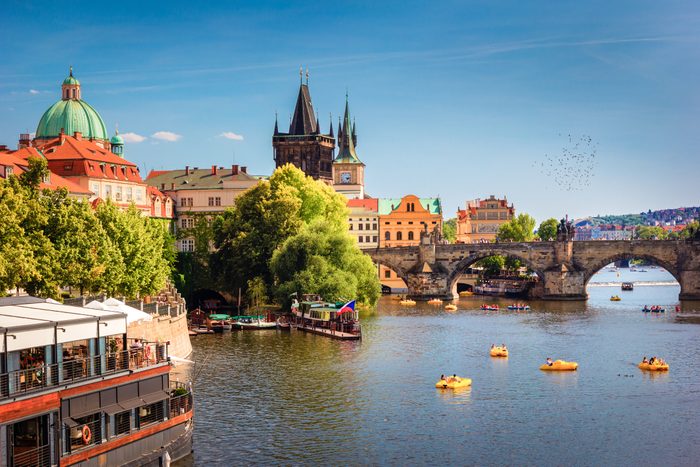
18. Czechia
Advice: Promote peace
Czechia, also known as the Czech Republic, is consistently ranked as one of the happiest countries on the World Happiness Report. One reason? It’s also consistently in the top 10 most peaceful countries in the world, boasting low crime rates and high safety stats, according to the Global Peace Index.
“I moved here from the U.S. eight years ago, and I feel much safer here than in my home country,” says Matt, a 48-year-old resident of Prague. “I’ve never even seen a violent crime happen here, much less been the victim of one. Plus, they have an amazing arts and culture scene, there’s something new to see every weekend.”
Get inspired to promote peace wherever you live with these beautiful quotes about peace from world leaders.

17. Belgium
Advice: Learn a second (or third) language
Thanks to a high standard of living, Belgium is consistently ranked as one of the best places to live in Europe. In addition to the good work-life balance, better-than-average incomes, civic engagement, accessible health care and excellent education, Belgians have a unique cultural heritage due to the country’s two distinct linguistic communities: Dutch-speaking Flemish and French-speaking Walloons. Plus, Belgium added German as a national language, making three. Because of this, children are often raised speaking multiple languages, which has been shown to increase cognitive skills, speech acuity and intelligence. Learning a new language, even if you never become fluent, is one of the best things you can do for your brain as you age.
“We Flemish like to joke that Wallonia is dragging the national happiness score down and we would have been on top if it weren’t for them, but really, it’s a beautiful place and they’re very funny people—they like to make lots of jokes about us too,” says Nico, a 26-year-old native in Antwerp. “And since we speak French, we know what they’re saying about us!”

16. Germany
Advice: Have a good sense of humor
“Germans are not happy people, but we do like to be the best, so whatever Germans these people surveyed probably lied about their happiness just to keep our rank high,” laughs Hanna, a 40-year-old from Munich. But seriously, there are a lot of things that she says make Germany a great place to live: “We have a great health-care system and long parental leave policy—for men as well—which was so helpful when we had our daughter. Plus, we get a guaranteed long vacation, the minimum is six weeks per year.” In addition, she notes the country’s public transportation system, low unemployment and a thriving economy, all of which help explain why Germany scores high in life satisfaction and happiness—even if some Germans don’t want to publicly admit it.
Finding something to laugh about every day—including where you live—has incredible health benefits, from lower blood pressure and stress to feeling more connected with others and a greater sense of overall well-being.

15. United States
Advice: Do an act of kindness every day
This year saw the States rise three spots, from No. 18. One reason cited is that 2022 wasn’t a presidential election year, so some of the political divisiveness died down. But the U.S. did achieve one distinctive rating: the biggest inequality in life satisfaction. This means that the happy people were far more satisfied with their lives (by 19 points) than the least happy people. And the most happy were the richest Americans, while the least happy were the poorest. (To compare, in Afghanistan, the least happy country in the world, everyone reported being miserable—but equally so.) This inequality can be a big problem, as it leads to more division and political and societal instability. Plus, wealth inequality affects every aspect index of happiness, from education to health care to lifespan. Even so, there’s no place like home. America has one of the most diverse populations of any country, a mix that produces incredible art, entertainment and innovation.
One of the easiest and best ways to fight division? Practicing kindness—and sharing stories about Americans’ legendary kindness and generosity. Add to the happiness of your community by doing one random act of kindness a day.

14. Ireland
Advice: Play a musical instrument or sing
Life expectancy in Ireland has climbed considerably since 2000. Social services have also been expanded to better care for those in need. Ireland also welcomes immigrants—the country ranked 11th on the World Happiness Report’s list of most tolerant countries. But one thing the data doesn’t show? Ireland’s rich music culture, which has given the world instruments like the fiddle, bodhrán and uilleann pipes, as well as many internationally famous musicians such as The Cranberries, U2, Van Morrison and Enya. “Nothing makes me happier than listening to traditional Irish music with my family,” says Emily, a 22-year-old in Dublin. “We have a very tight-knit family, and part of how we bond is through music.”
Even if you don’t play an instrument, you can sing, dance or just clap along with others. A sense of community is just one of the hidden health benefits of music.

13. Canada
Advice: Maintain a healthy work-life balance
Many jokes are made about Canadian politeness, but having good manners is a powerful form of social support and generosity. In addition, Canada boasts a strong social safety net and a high quality of living, and their work-life balance puts as much emphasis on life as it does on work; family and friends take precedence.
“Canadian niceness isn’t fake, it is a real thing! I honestly think we are happy because we do genuinely try to be kind, as the norm,” says Alanna, a 34-year-old from British Columbia. “And it is true that we have better work-life balance, and allowing more time for what’s really important brings true happiness.”
Do you have any of these signs you’re headed for a work burnout? Take a step back from your laptop and follow our Northern neighbors by finding ways to work moments of joy into your daily life.

12. Australia
Advice: Hit the beach
Australia slipped down two places in this year’s report, but that fact doesn’t faze Australians, who are notoriously easygoing. Perhaps it’s their high standard of living, low unemployment, family-friendly policies and multiculturalism. Or maybe it’s the surfing.
“Australians are very chill and tend to value time over money—we work to live, not the other way around,” says Cyndi, a 61-year-old from the Gold Coast who grew up surfing, kiteboarding and swimming in the ocean and says she works to support those hobbies. “Nothing makes me happier than the ocean, even if it’s just walking along the beach. When it comes to beaches, you simply can’t top Australia.”
Spending time in nature is one of the surest and quickest ways to boost happiness. And with more than 10,000 beaches—including some of the world’s most famous and beautiful, such as Bondi Beach and Whitehaven Beach—there are plenty of opportunities to enjoy the ocean life.

11. Austria
Advice: Be active in your community
Austria kept its spot in the top 20, perhaps in part because unemployment is so low and the population is well educated: 85% of adults have achieved a secondary education or higher. But what really sets Austrians apart is a strong sense of community and civic duty—75% of Austrians vote.
Voting, volunteering and joining groups are just a few ways to build up your community where you live. And it’s worth the effort: People with a strong community not only live longer lives—their lives are happier and healthier to the end, according to the Harvard Longevity Study, the longest-running study in the world on adult health and happiness.
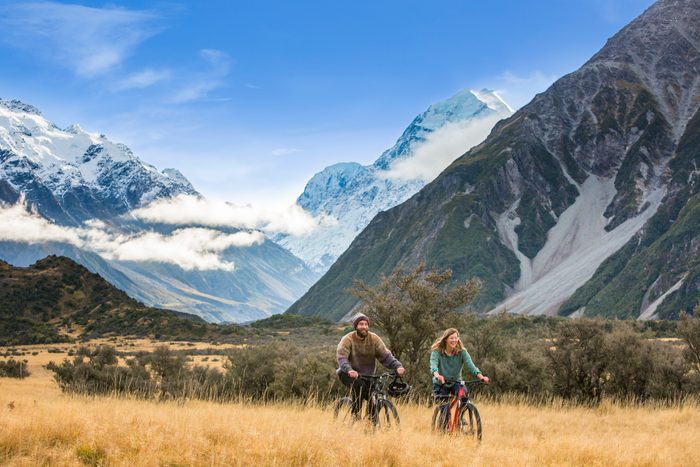
10. New Zealand
Advice: Spend your money on experiences, not things
Kiwis’ happiness may have more to do with attitude than anything else: Unimpressed by status or money, they’re more likely to be found exploring nature than working overtime. Immigrants to New Zealand are accepted as locals even before they gain citizenship. (You need to establish residency there for five years before taking the plunge.)
“I’d say we tend to not be very possession-driven, because things are more expensive here, so we get more enjoyment out of experiences,” says Lily, a 28-year-old living in Christchurch. “It also makes me happy that, for the most part, people are really nice, we are pretty patient with each other.”
Lily’s on to something: Science says that money can buy happiness—but only when it’s spent in ways that will bring real joy. And spending it on fun experiences with others is one of the top expert-recommended tips for how to spend your money to be happier.
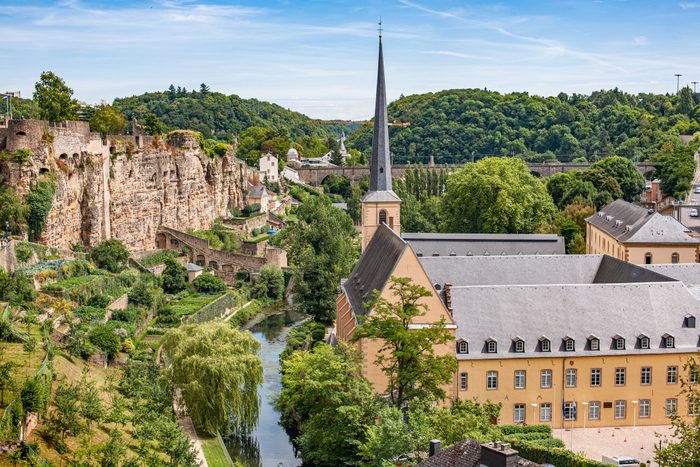
9. Luxembourg
Advice: Get out of your comfort zone
This small rural country is filled with natural parks, fairy-tale castles and lots and lots of cows—often right next to office buildings. One study, reported in GEO, ranked Luxembourg’s capital city as one of the most relaxed cosmopolitan areas in the world. The green space, low-density population and a calm national character support the positive mood.
“My favorite part of living here is how centrally located it is in Western Europe—there are so many great things to see, both in and out of the country, that are a short train ride away,” says Luther, a 48-year-old who moved to Luxembourg City five years ago. “Every weekend is a new adventure because traveling here is so easy. I also love how international the population is.”
Traveling is a great way to try new things, learn new languages and increase your daily exercise by walking more—all things shown by science to make you happier! Love to travel but you’re on a budget? Here’s how to travel for free (seriously!).

8. Switzerland
Advice: Enjoy some high-quality chocolate
The first things that come to mind when people think of Switzerland are the majestic Alps and heavenly Swiss chocolate. But the key to Swiss happiness also appears to be the governmental efficiency that ranges from the local to the national level. The Swiss have very little anxiety about their politics, which may explain their notoriously calm natures. According to the OECD (Organization for Economic Cooperation and Development) Better Life Index, Switzerland ranks high in terms of housing, personal security, work-life balance, disposable income and green living.
You can’t change the governmental efficiency of your home country (at least not on your own), but one Swiss trick you can do today is to enjoy a little bit of really good chocolate—the theobromine is a proven mood booster. Don’t have a sweet tooth? Try one of these instant mood boosters you’ll want to make a habit.

7. Norway
Advice: Drink more water
Why are Norwegians consistently among the top 10 happiest people? Their workweek is shorter than ours, and their vacations are longer. Folks lucky enough to live in Norway get out of work early to pursue their passions, including activities such as hiking, biking, hanging out with their kids and socializing with friends. And if that’s not enough: Norway also has less income disparity and more job satisfaction, as well as a heightened sense of trust in elected officials. Plus, an easy equality exists between men and women, which helps ensure the absence of a glass ceiling.
One of the best things about Norway that people may not know, however, is that it’s tied with the other Scandinavian countries for the No. 1 best water quality in the world.
“I grew up in Oslo, and it spoiled me on water,” says Norah, a 68-year-old who now lives in Trondheim. “I’ve traveled all over the world, and every time I come back, it’s like ecstasy drinking the water here. Right out of the tap! It’s the purest and best.”
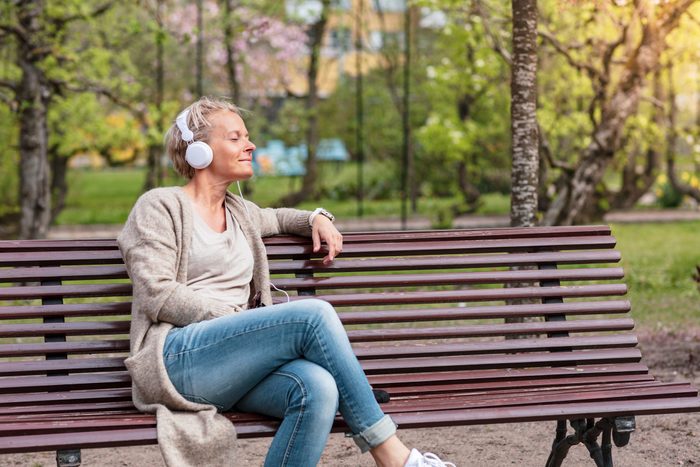
6. Sweden
Advice: Learn to be content with what you have
Their taxes are high, but their health care and higher education are free, and most Swedes feel like that’s a great balance. Plus, many visitors notice how so many people in Sweden are always smiling. Their legendary happiness may be, in part, generated by Sweden’s rich communal spirit—the spirit of lagom. This word has no English counterpart, but the best way we can explain it is that you’re content with what you have, and you enjoy all things in moderation.
“I think we are happy because we’re generally pretty content. There’s a lot less negative comparison, and we enjoy what we have instead of always striving for more,” says Gordon, a 30-year-old from Gothenburg. “Our culture is not all about the individual getting ahead or winning.”
Starting your day by thinking of what you are grateful for is one of the best ways to wake up happier every day.

5. Netherlands
Advice: Prioritize family and loved ones
Having close relationships with loved ones is the No. 1 key to happiness, according to the Harvard Longevity Study, and no country shines as much in family-friendliness as The Netherlands. It starts with birth: Most Dutch women choose a home birth over a hospital one, and only 8% use pain medication, according to NPR. The government gives generous parental leave for both parents, offsets adoption costs and provides every child under 18 with a “kinderbijslag,” or “child benefit,” of about $300–$400 USD per quarter ($1,200–$1,600 USD per year). They extend this love to others, welcoming immigrants from many nations.
“If you’re going to have a family, do it in the Netherlands—there are so many benefits for parents and children, like free school and a flex schedule for work,” says Sofia, a 39-year-old in Amsterdam. “Most jobs allow people to work any percentage (like 20%, 50, 70), which makes it a ton more flexible for parents. Most parents are working 60 or 70, [but] barely ever both at 100%. This has very much contributed to my happiness and my kids’ happiness.”
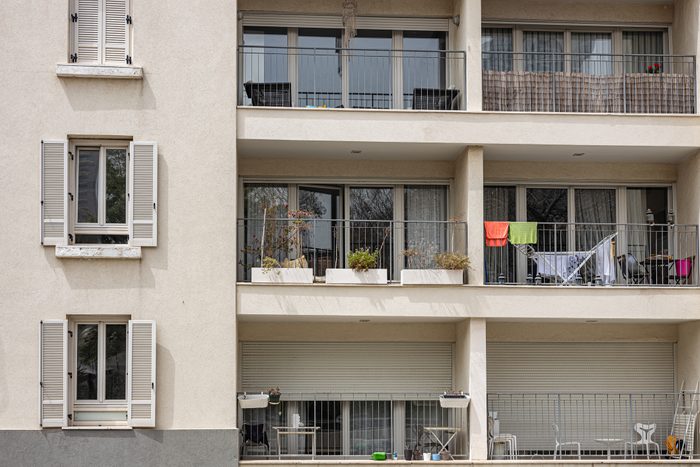
4. Israel
Advice: Get to know your neighbors
Israelis have the rare combination of lives that are both exceptionally long—83 years, one of the highest life expectancies in the world—and exceptionally happy. Israel achieves the first through a common-sense health-care system that is both accessible and cutting-edge. But their secret to happiness may be, well, right around the corner. As one of the smallest countries in the world, they have a high population density, meaning that neighbors are often very close—in more ways than one.
“I grew up playing in the streets with my siblings and the neighborhood kids, we were in and out of every house,” says Maia, a 52-year-old from Tel Aviv. “Today, I probably spend more time at my neighbors’ homes than I do in my own. We share coffee, sugar, gossip. When I visited America I couldn’t believe how many people don’t even know their neighbors’ names! Without my neighbors I wouldn’t exist.”
Learning your neighbors’ names and connecting with those around you in small daily ways are one of the best ways to be happier without really even trying.

3. Iceland
Advice: Hike to a hot springs (or somewhere fun)
The most sparsely populated European country, Iceland boasts an enticing mix of ancient tradition and modern economic growth. Iceland is the land of the midnight sun, but also, of ever-darkening winter days and bitter cold. Could the reason for the country’s outlook be found in the water? Iceland’s communal pools—all heated, many by natural hot springs—are the heart of each community, fostering well-being and camaraderie during the harshest winter months. An interesting Icelandic fact: Most of this freezing-cold country is heated by geothermal activity, making it one of the greenest on the planet.
“The best part about Iceland is everyone knows everybody else. The worst part about Iceland is … everyone knows everybody else. Nobody ever moves,” says Jón, a 67-year-old living in Reykjavik, who adds he’s lived there his entire life. (Fact: Icelanders are all so closely related to one another that there’s a dating app designed to help them avoid accidental incest.) One reason he stays? “The landscape is breathtaking. It’s spectacular. It’s like nothing anywhere else. It’s very unique.”
His favorite happiness activity is hiking across the stunning landscapes and taking photos. Enjoying hiking in the great outdoors is one of the things the world’s healthiest (and happiest) folks have in common.
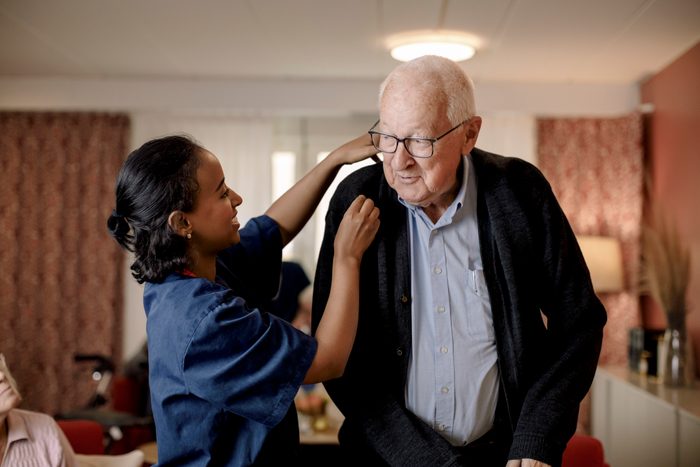
2. Denmark
Advice: Practice humility
Bernie Sanders famously pointed to this Scandinavian country as the epitome of his American dream. Yes, the taxes in this colorful country are high, but so is the quality of services provided to its citizens. Here, everyone is well cared for, including the elderly, people with disabilities and kids. Parents get a year of paid parental leave, college students get free tuition, child care is covered for working parents and citizens get a pension they can actually retire on. The Scandinavian concept of janteloven may also play a part:
“When I was younger I hated ‘janteloven.’ It’s basically a saying we are taught, that you’re not anything special. You should never try to excel or be different or consider yourself as more valuable than others,” says Mette, a 27-year-old in Copenhagen. “I preferred the American concept that you could be the star or the hero. But as I got older I realized the wisdom in staying humble. It builds community and makes one more open to learning and accepting of faults. It isn’t saying that you’re not special, period, it’s that we’re not more special than anyone else, and that brings more happiness, I think.”

1. Finland
Advice: Disconnect from your phone and de-stress in a sauna
This year’s winner, at No. 1, is Finland. This isn’t a surprise, as Finland has topped the list for six years running! And not only are they happiest but their scores are “significantly higher” than even No. 2 Denmark. Finland’s citizens polled highest for the report’s most significant happiness criteria: a good life expectancy, strong social support, equitable income distribution, generosity, trust and freedom. All those saunas probably help pick up the spirits as well: At last count, Finland boasted almost as many saunas as people: 3.3 million.
“Saunas have become a cliche of Finland, but there’s a reason for that. In fact the word sauna comes from Finnish,” says Leo, a 27-year-old in Espoo. “But it’s true, everyone has access to sauna here, my apartment building has one, houses have them too. I relax in there by myself or with friends almost daily. The best part is you can’t take your phone in there, it’s too hot, it will fry a phone, so it forces you to disconnect from everything and just relax.”
Saunas have amazing health benefits—boosts in mood being at the top—but even if you don’t have a sauna, taking time every day to do a digital detox and disconnect from your phone and computer can quickly and remarkably increase your happiness.
Next, find out the tiny changes you can make to be happier. Plus, see what country has the highest population.
Sources:
- OECD Better Life Index: “Austria”
- GEO: “The ten most relaxed cities in the world”
- World Population Review: “Water Quality by Country”
- NPR: “Netherlands’ Health Care Reflects National Values”
